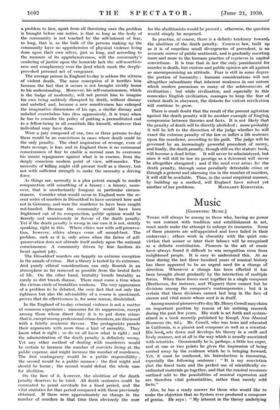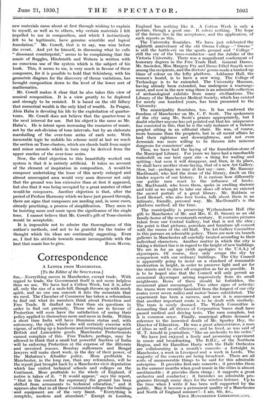M us ic
[GEOMETRIC MUSIC.]
THERE will always be among us those who, having no power to rest content with tradition and establishment in art, must needs make the attempt to enlarge its resources. Some of these pioneers are self-appointed and have failed in their endeavour ; others work in obscurity with the quiet con- viction that sooner or later their labour will be recognized as a definite contribution. Pioneers in the art of music have always found it difficult to win recognition even from enlightened people. It is easy to understand this. At no time during the last three hundred years of musical history has there appeared to be an urgent need for a change of direction. Whenever a change has been effected it has been brought about gradually by the interaction of multiple forces. When these forces meet together in a single composer (Beethoven, for instance, and Wagner) there cannot but be divisions among the composer's contemporaries ; but it is certain that these divisions cannot last long in the face of sincere and vital music whose seed is in itself.
Among musical pioneers of to-day Mr. Henry Cowell may claim an important position by reason of his untiring research during the past few years. His work is set forth and system- atized in a book recently published by Knopf, New Musical Resources (8s. 6d.). Mr. Cowell, who was born and educated in California, is a pianist and composer as well as a scientist- His book„, sets down and develops his theory in a swift and lively manner, not at all in the way which is usually associated with scientists. Occasionally he is, perhaps, a little too eager, and at one or two points he gives the impression of being carried away by the evidence which he is bringing forward. Yet, it must be confessed, his Introduction is reassuring, especially the following sentence : " It is my conviction that the finest taste and the perfect use of scientifically co- ordinated materials go together, and that the musical resources outlined add to the possibilities of musical expression and are therefore vital potentialities, rather than merely cold facts."
Also, he has a ready answer for those who would like to make the objection that no System ever produced. a composer of genius. He says : " My interest in the theory underlying
new materials came about at first through wishing to explain to myself, as well as to others, why certain materials I felt impelled to use in composition, and which I instinctively felt to be legitimate, have genuine scientific and logical foundation." Mr. Cowell, that is to say, was wise before the event. And yet he himself, in discussing what he calls " dissonant counterpoint," seems to be complaining that the music of Ruggles, Hindemith and Webern is written with no conscious use of the system which is the subject of his book. This, it seems to me, is very much in favour of these composers, for it is possible to hold that Schonberg, with his geometric diagram for the discovery of theme variations, has brought composition down to the level of the lower sort of mathematics.
Mr. Cowell makes it clear that he also takes this view of musical composition. It is a view greatly to be deplored and strongly to be resisted. It is based on the old fallacy that numerical wealth is the only kind of wealth. In Prague, Alois Haba is devoting his life to the exploitation of quarter- tones. Mr. Cowell does not believe that the quarter-tone is the next interval for use. But his object is the same as Mr. Haba's. He is intent upon increasing the resources of music, not by the sub-division of tone intervals, but by an elaborate marshalling of the over-tone series of each note. With inexorable logic he unfolds his scheme until at last we reach the section on Tone-clusters, which are chords built from major and minor seconds which in turn may be derived from the upper reaches of the over-tone series.
Now, the chief objection to this beautifully worked out system is that it is entirely artificial. It takes no account of the element of inspiration in composition. A would-be composer undertaking the lease of this newly enlarged and almost unoccupied area would very soon discover not only that the ground was less extensive than at first it appeared, but also that it was being occupied by a great number of other would-be composers. Another objection is that, after the period of Profuse Harmony which we have just passed through, there are signs that composers are needing and, in some cases, already practising, a process of simplification. They seem to be insisting more and more upon the significance of the single tone. I cannot believe that Mr. Cowell's gift of Tone-clusters _would be acceptable.
It is impossible not to admire the thoroughness of this author's methods, and not to be grateful for the trains of - thought which his ideas are continually suggesting. Even .so, I find his attitude towards music incompatible with the









































 Previous page
Previous page